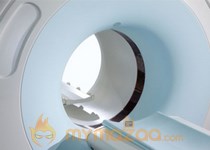Computerized tomography (CT) scans may cause cellular damage— a finding that further encourages doctors to use the lowest radiation dose possible as a precaution, according to preliminary research from the Stanford University School of Medicine.
“[CT scans] are good in terms of helping doctors manage and diagnose patients— we’re not discounting that— but they do expose patients to some level of radiation,” lead study author, Dr. Patricia Nguyen, an assistant professor of cardiovascular medicine at Stanford, told FoxNews.com.
The use of CT scans has soared over the past 20 years, with an estimated one in 10 Americans undergoing the imaging test each year. Previous research has shown that the amount of radiation a patient is exposed to in a single CT scan is equal to one year of natural background radiation, 3 mSv, Nguyen said. The actual amount of radiation a patient is exposed to depends on the type of scan and amount of scanning done. For example, an X-ray has 0.02 to 0.1 mSv, CT scans are in the range of 3 to 7 mSv. Other factors that can impact exposure are patient weight and heart rate. If a patient’s heartbeat is irregular, doctors can’t use newer technology for the scan, increasing the likelihood a patient would be exposed to more radiation.
For their study, published Wednesday in the Journal of the American College of Cardiology: Cardiovascular Imaging, researchers examined the blood of 67 patients undergoing cardiac CT angiograms (CTA), and measured biomarkers of DNA damage before and after undergoing the procedure.
Researchers found an increase in DNA damage and cell death after a single CT scan, but most of the cells were repaired or eliminated. Scientists don’t yet know whether that cellular damage affects cancer risk.
“It’s very hard to track single cells and see what happens to them— if they develop into cancer over time,” Nguyen said. “It’s probably not feasible using current technology.”
While scientists also don’t know what happens to cells that aren’t repaired or replenished, such cellular damage can be problematic, Nguyen said. For example, when elderly adults lose certain immune-boosting T-cells, they may be at a higher risk of infection.
More research is needed to understand the exact outcome of low-dose radiation and whether doctors can take measures to help protect patients, such as the application of UV-blocking sunscreen.
In addition, researchers found that single-dose scans done at doses lower than 7.5 mSv did not damage cells.
Researchers emphasized the importance of using the lowest dose necessary for diagnostic imaging, as recommended by the federal government.
“There’s a lot of concern among physicians and patients, in terms of radiation doses from CT scans. In the past, we didn’t really have a good idea as to how much potential damage there was; I think this study sheds some additional light into it,” senior study author Dr. Joseph Wu, a professor of medicine and of radiology and the director of the Stanford Cardiovascular Institute, told FoxNews.com. “At a certain dose and above we can actually see cell damage, [but] below that, we don’t, to the best of our technology in 2015.”
“We’ll see as technology evolves in the future, radiologists and cardiologists will be able to implement some of these new imaging sequencing to provide as low a dose as possible to the patient,” Wu said.
More studies are needed for the effects of repeated doses of radiation, researchers said.
They pointed out their study does not advise patients to completely avoid diagnostic testing.
“As a patient, you should ask if you really need the scan. If the doctor says it will help, of course get it; the disease you have is best served by a scan to find out the diagnosis, what to do, and how to manage the disease,” Nguyen said. “These are useful tests.”
If there’s an option to get a non-radiation producing tests, patients can consider that, she added. For example, for a stress test, a stress echo doesn’t produce radiation, while nuclear scans and CT scans do. She advised patients to ask their doctors if they’re using the newest technology available, which can help guarantee lower exposure to radiation.
“When I get a CT [scan] I would ask my doctor what the radiation dose exposure is, so you are aware and so that the doctor is aware that you are an informed consumer,” Wu added. “We don’t want to have a kind of scare tactic that have patients all worried about CT scans.”







